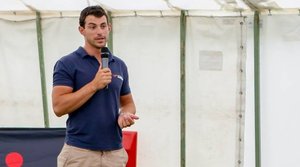How simple mistakes in reflection can you stifle your athletic development?
In this latest article, Coach Philip looks at some common ways that athletes fail to reflect appropriately and lose an excellent opportunity to learn, grow and evolve between seasons. Have a read at how you can ensure you don’t make the same mistakes and build on each season.
Have you ever sat in a meeting when your boss or line manager says, “I have this great idea to solve a problem; here it is. Does anyone else have any ideas?” Or perhaps you were talking to a friend, and they tell you the solution to their problem and then ask for your advice. The problem with both approaches is that the person originating the discussion already has an opinion. The same can be true with athletes stifling their athletic performance.
At this point in the season, athletes will spend time reflecting on the races. They did over the summer, and they’re looking to try and understand how they can gain an edge and make a marked improvement for the following year.
It is very common for coaches to have a conversation with an athlete where the athlete has already decided on what has happened and what they need to do to fix it before they’ve even considered some alternative options or strategies. This bias or potential blinding of the athlete means they’re often unable to see potential opportunities for further improvement, or sometimes they miss the big picture for the detail.
There are three common points where athletes are more likely to stifle their own athletic development;
The first is when an athlete has an unrealistic sense of their own ability. This may be overinflated or undervalued. In this instance, the solution that an athlete presents immediately is based upon an assumption of them being better or worse than they really are. Applying that newfound strategy can cause issues because the reality of the athlete and their beliefs are different.
The other time when athletes tend to present the wrong plan and miss the chance to learn is when they don’t explore the full facts of an incident. A simple example could be when an athlete says they must work on their running because they never run well in a triathlon event. In reality, the problem is more based on their approach to cycling.
The final time athletes make big mistakes is when they spend too long comparing themselves inaccurately to other athletes. At an extreme, this might be when they compare their approach to a professional athlete’s when they are not a professional or markedly comparing themselves to what they see or think other athletes are doing (for example, on social media). Either way, this comparison has its uses, but only when understanding the standard an athlete needs to reach.
For example, if they want to win their age group, a sensible comparison would be to see what times they win their category and break it down by sport to have targets to work from. An improper comparison could be when the athlete concludes they need more training because that’s what others are doing. This unrealistic sense of what they must do based on other people can lead to adverse outcomes.
Therefore, as we are in the heart of reflecting on the season and planning for the following year, ensure you take the time to objectively reflect on all aspects of your racing and training and make a plan while being open to several varied hypotheses or alternative directions. Presenting your idea and then asking other people for advice means you will struggle to get any accurate or helpful feedback, except from those people who are willing to challenge you, and from those whom you are accepting of their challenge. If you go back to the example of the boss in the boardroom, it is easy to realise that it is unlikely they will get that many people challenging them, especially if you are the boss and talking about your own beliefs about your sport.

Philip is the founder of Tri Training Harder LLP. He’s a British Triathlon Level 3 coach, and has been coaching for over a decade and is involved with mentoring and developing other coaches.
Philip has have coached athletes to European and World AG wins, elite racing, many Kona qualifications, IRONMAN podiums and AG wins.
Alongside the conventional development through many CPD courses, he has also been fortunate enough to work alongside experts in the fields of Physiotherapy, Strength and Conditioning, Nutrition, Psychology, Biomechanics, Sports Medicine. Putting this knowledge into practice he has worked with thousands of athletes to various degrees, from training camps in Portugal and around Europe, clinics in the UK and online coaching.
Visit Philip's
Coach profile
We’re here to help
Tri Training Harder are one of the leading Triathlon coaching providers in the UK, using our wealth of experience to unite scientific and technological research with already well-established and successful best practices, to create a formula for triathlon and endurance coaching that works.
The result is an honest, dynamic, yet simple new way of constructing an athlete’s training to allow them to reach their potential.
If you’re planning your next season, just starting out in the sport or are looking for extra guidance at the very top end of the field, we are here to help, and our coaches would be delighted to hear from you. You can contact us via the website, and one of the team will be in touch.

